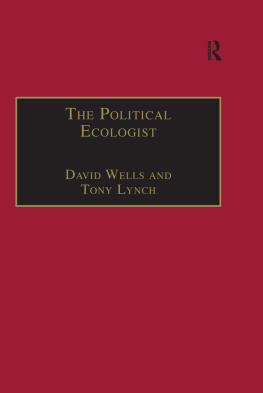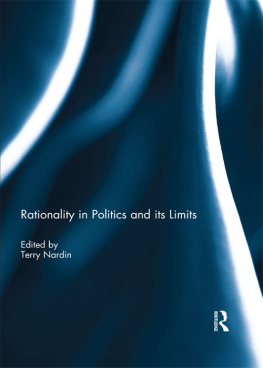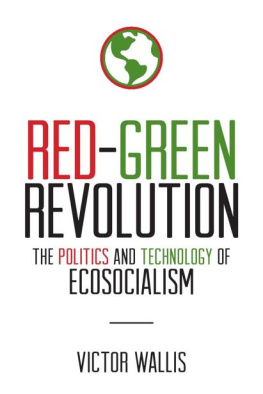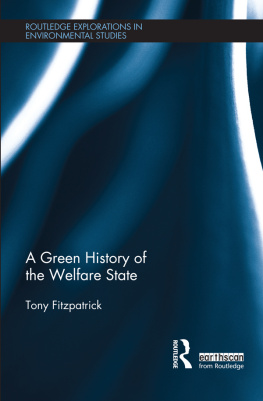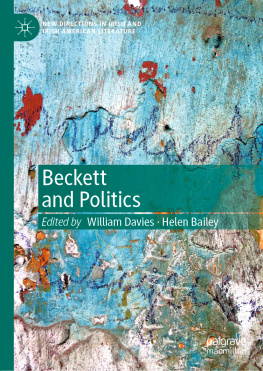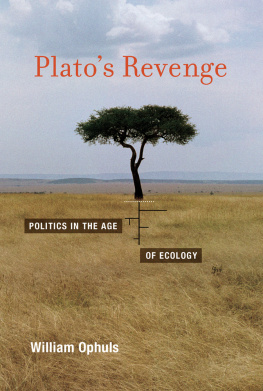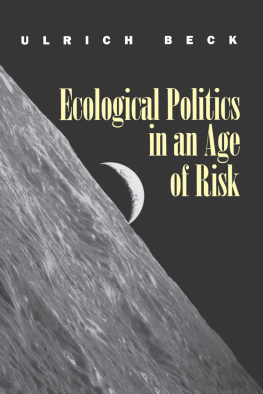To our parents and our children.
First published 2000 by Ashgate Publishing
Published 2016 by Routledge
2 Park Square, Milton Park, Abingdon, Oxon OX14 4RN
711 Third Avenue, New York, NY 10017, USA
Routledge is an imprint of the Taylor & Francis Group, an informa business
Copyright David Wells and Tony Lynch 2000
All rights reserved. No part of this book may be reprinted or reproduced or utilised in any form or by any electronic, mechanical, or other means, now known or hereafter invented, including photocopying and recording, or in any information storage or retrieval system, without permission in writing from the publishers.
Notice:
Product or corporate names may be trademarks or registered trademarks, and are used only for identification and explanation without intent to infringe.
British Library Cataloguing in Publication Data
Wells, David
The political ecologist
1. Political ecology - Great Britain 2. Environmentalism Great Britain 3. Green movement - Political aspects - Great Britain
I. Title II. Lynch, Tony
322.4'0941
Library of Congress Catalog Card Number: 99-76343
ISBN 13: 978-0-7546-1119-6 (hbk)
Not everyone today exhibits a concern for the well-being of our shared environment. For some such a concern is simple delusion, for everything is fine, and is going to be fine. We discuss this sanguine denial in the following chapter. But if for most of us the concern is there it is very often swamped, even negated, by a concern for our private environmentthe luxury of a car and house, the conditions and possibilities of travel, the opportunities for employment, personal enrichment, and so on. Perhaps this concern for the private environment at the expense of the public is ultimately self-defeating: if there is enough public squalor and neglect then there can be no real private comfort or luxury. But still such a focus is understandable, for it reflects some key features of modernity. So it is that the operations of unfettered capitalism are thought by many to harness private ends to public goods without the need for rules and structures of explicit public concern. The "free" or "socially disembedded" market will ensure that supply and demand are neatly and sustainably matched, not only for manufactured widgets and financial goods, but for natural resources and environmental goods generally; and if there are market-failures, if there are burgeoning "negative externalities", well they too can be met by extending the market into new areas, or quietened by the assumption that "overall" negative externalities will be matched by their positive brothers, so that the effective sum is zero and rightfully omitted from economic calculation.
It is an orthodoxy today that government action on behalf of the public interest is to be viewed with deep suspicion, even hostility. Such intervention and action is stigmatised as inherently incompetent, self-serving and ineffective, even pernicious to the extent that its welfarist implications are felt to undermine "individual enterprise" and "personal responsibility" for the parasitic comforts of the "culture of dependency". Add to this a climate of deepening economic insecurity and destabilising social change in which individuals are increasingly forced to think in the privatised terms of immediate self-interest, and we have a recipe which systematically cuts against explicit and effective public action anywhere, including the protection and provision of environmental goods.
Such a recipe gains further authority because of the seemingly fragmented and ''unrealistic" prescriptions for environmental protection and respect pushed by many environmentalists. Those who claim a certain "hard headed realism" look with piteous contempt on "Greenies" who may insist, among other things, that we develop a new "non-anthropocentric" ethic in which natural entities and processes are attributed as much moral standing as anything human; that we replace a socio-political program of economic growth with that of a steadystate, even declining, standard of material well-being; and that we lock up forever natural resources on which the possibilities of escaping poverty for many of the world depend.
Even worse for the environmental movement in the eyes of its critics, is the fact there is no agreement, even amongst the most sincere advocates of environmental protection and concern, on what would constitute a truly green politics. Here views range from the centralised authoritarianism championed by William Ophuls, and the social ecologist movement; from the "working within the system" approach favoured by human welfare ecologists, to the terroristic directives of those "eco-warriors" influenced by the "Earth First!" movement. But it is not simply diversity alone which weakens the environmentalist's case-after all, diversity can be a boon if it reflects the results of rigorous inquiry-it is the seeming inability of such approaches to give a principled articulation of environmental politics which fits it with continuing concerns for social justice and equity. So, for instance, there is at present in the Australian context a battle within the environmental movement concerning the creation and imposition of private tollways. For some ( eg, the Total Environment Centre) such private tollways are desirable because they place an addition cost on vehicular travel, and so discourage a polluting activity; that such a measure is fiscally regressive is thought not to the point; what comes first is the environment, equity at best a distant second. For others ( eg, The Australian Greens) such fiscal regression is to be condemned precisely because of its inequitable effects. For the Australian Green Senator Bob Brown, environmental concerns cannot genuinely be realised in or through the production of human injustice.
In sum the critics of environmentalism argue one or all of the following: that explicit environmental concern is unnecessary given that a functional free market economy will provide public benefits more effectively and efficiently than a system of organised public concern; that the environmentalist program is at best, morally, economically and politically unrealistically utopian, and at worst positively pernicious; and that the environmental movement itself is so racked with conflicts and confusions as to be incapable of providing a principled approach to the broader issues of moral and political decision-making.
In this book we aim to provide a satisfying answer to these charges. We develop a comprehensive and coherent politics not only for the environmentally concerned but for all concerned to uncover a "third-way" between the authoritarianism of the centralised state and the brutalities of the unrestricted market. The upshot of our argument is that rightly understood green politics is a formeven the original formof Liberal politics understood as an encompassing concern for the sustaining background conditions of a flourishing social life. Such a concern is not directly a concern with what people want-wants occupy the political and personal foregroundbut with what they need so as to have the possibility of such a foreground. We call this "third way", this needs-based politics of the background, Political Ecology, and its novelty lies neither with environmentalism or with liberalism alone, but in their essential conjunction. For while opposition to environmentalism comes from many quarters, conservative and socialist as well as liberal, it is the liberal critique of the public dimension environmentalism implies which today carries the most force. We think this critique is mistaken on its own terms; that it reflects an understandable though regrettable misunderstanding of liberalism itself. For liberal politics, in the hands of its foundational thinker John Locke, just is a politics of the background. It arises as a means of dealing effectively with collectively generated environmental failures through the internalisation of risk in the development of systems of communal self-insurance. And while Locke's argument focuses on failures in the human environmentthe lack of personal and material security and the generation of vicious cycles of injusticehis "social contract" strategy generalises to the provisions of the natural environment. A point implicit in Garrett Hardin's reading of environmentalism through the parable of "tragedy of the commons".

